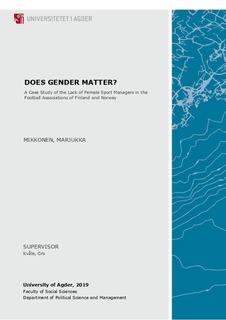| dc.contributor.author | Mikkonen, Marjukka | |
| dc.date.accessioned | 2019-09-26T10:00:41Z | |
| dc.date.available | 2019-09-26T10:00:41Z | |
| dc.date.issued | 2019 | |
| dc.identifier.uri | http://hdl.handle.net/11250/2618929 | |
| dc.description | Master's thesis Innovative governance and public management ME523 - University of Agder 2019 | nb_NO |
| dc.description.abstract | The aim of this research is to address why there are fewer female leaders in the football associations of Finland and Norway and what are the underlying factors influencing the phenomenon. The research problem is approached with a multiple case study method, the object of research being the factors influencing women’s careers in the football associations.The empirical material of this qualitative research consists of interviews of three female and two male leaders from the football association of Finland and two female and two male leaders from the football association of Norway. The interview data are analyzed with abductive content analysis and the theoretical lens is basing on women’s career research and sport management. The focus of the empirical material is on the obstacles of individual and organizational levels.The results of this research suggest that the position of women and their careers are rather similar in both case organizations. The hindrances of women’s leadership careers in football governance emerge from three levels: societal, organizational and individual levels. The traditional perception of the masculinity of football and leadership seem to have a strong influence that impacts factors on individual and organizational level. Gendering and traditional gender roles are still visible. Women often lack the football competence required for many positions in the associations. In addition, women are not applying for leading positions on the same volume as men. Both organizations have challenges in communicating their more equal environment of today and thus attracting competent female leaders. Another organizational level factor is women directing towards expert positions as HR manager that do not further career towards the top management. Modern leadership style that bases on more feminine characteristics as empathy, discussion and listening skills is appreciated in both organizations that creates demand for female leaders. However, also men have adopted this more feminine approach, which may decrease the need for furthering the careers of female leaders.Sport managementand female leadership is rarely studied. The results of this research are a good base for further research in this topic. The resemblance of the results of these two cases suggest that the same kind of study done in a similar context would presumably givesimilar results. However, more research is needed on different context for more generalizable results. An interesting direction for further research is to compare the factors influencing women’s leadership careers in football and in a more feminine sport. | nb_NO |
| dc.language.iso | eng | nb_NO |
| dc.publisher | Universitetet i Agder ; University of Agder | nb_NO |
| dc.rights | Attribution-NonCommercial-NoDerivatives 4.0 Internasjonal | * |
| dc.rights.uri | http://creativecommons.org/licenses/by-nc-nd/4.0/deed.no | * |
| dc.subject | ME523 | nb_NO |
| dc.title | Does gender matter? : A Case Study of the Lack of Female Sport Managers in the Football Associations of Finland and Norway | nb_NO |
| dc.type | Master thesis | nb_NO |
| dc.subject.nsi | VDP::Samfunnsvitenskap: 200::Statsvitenskap og organisasjonsteori: 240::Offentlig og privat administrasjon: 242 | nb_NO |
| dc.subject.nsi | VDP::Samfunnsvitenskap: 200::Kvinne- og kjønnsstudier: 370 | nb_NO |
| dc.source.pagenumber | 110 p. | nb_NO |

